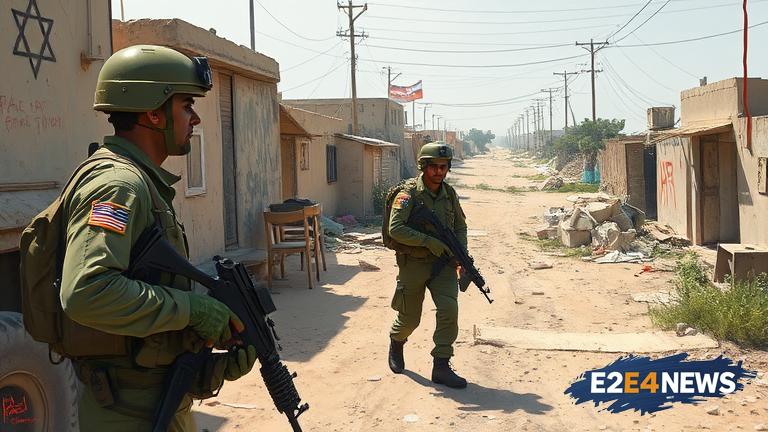The Israeli government, led by Prime Minister Benjamin Netanyahu, has been facing opposition from a group of soldiers who are refusing to enforce a expulsion zone in Gaza. The zone, which was established in response to the ongoing conflict between Israel and Hamas, has been the subject of controversy and debate. The soldiers, who are part of the Israeli Defense Forces (IDF), have stated that they will not participate in the enforcement of the zone, citing moral and ethical concerns. They argue that the zone is a form of collective punishment, which is prohibited under international law. The soldiers also claim that the zone will only serve to exacerbate the humanitarian crisis in Gaza, which has been devastated by years of conflict and poverty. The Israeli government has responded to the soldiers’ refusal by stating that they will be court-martialed and face disciplinary action. However, the soldiers remain resolute in their decision, stating that they are willing to face the consequences of their actions. The incident has sparked a wider debate about the morality and legality of the expulsion zone, with many human rights organizations and international leaders condemning the move. The United Nations has also weighed in on the issue, stating that the zone is a violation of international law and will only serve to worsen the humanitarian crisis in Gaza. The Israeli government has defended the zone, stating that it is necessary to protect Israeli citizens from the threat of Hamas. However, many experts argue that the zone is a form of retaliation and will only serve to escalate the conflict. The situation in Gaza remains dire, with many civilians caught in the crossfire and struggling to access basic necessities like food and water. The international community has called for an end to the violence and a negotiated settlement to the conflict. Despite the challenges, many remain hopeful that a peaceful resolution can be found. The incident has also highlighted the complexities and challenges of the Israeli-Palestinian conflict, which has been ongoing for decades. The conflict has resulted in the displacement of thousands of people, the destruction of infrastructure, and a severe humanitarian crisis. The international community has a critical role to play in resolving the conflict and promoting peace and stability in the region. The United States, the European Union, and other international leaders have called for a negotiated settlement and an end to the violence. However, a lasting solution will require a commitment to peace and a willingness to compromise from all parties involved. The situation in Gaza remains a pressing concern, and the international community must continue to work towards a peaceful resolution. The Israeli government must also take steps to address the humanitarian crisis in Gaza and work towards a negotiated settlement. The incident has also sparked a wider debate about the role of the military in society and the moral and ethical implications of following orders. Many have argued that the soldiers who refused to enforce the expulsion zone are heroes, who are standing up for what is right in the face of overwhelming opposition. Others have argued that the soldiers are traitors, who are undermining the authority of the government and the military. The debate highlights the complexities and challenges of the Israeli-Palestinian conflict, and the need for a nuanced and thoughtful approach to resolving the issue. The international community must continue to work towards a peaceful resolution, and the Israeli government must take steps to address the humanitarian crisis in Gaza.
